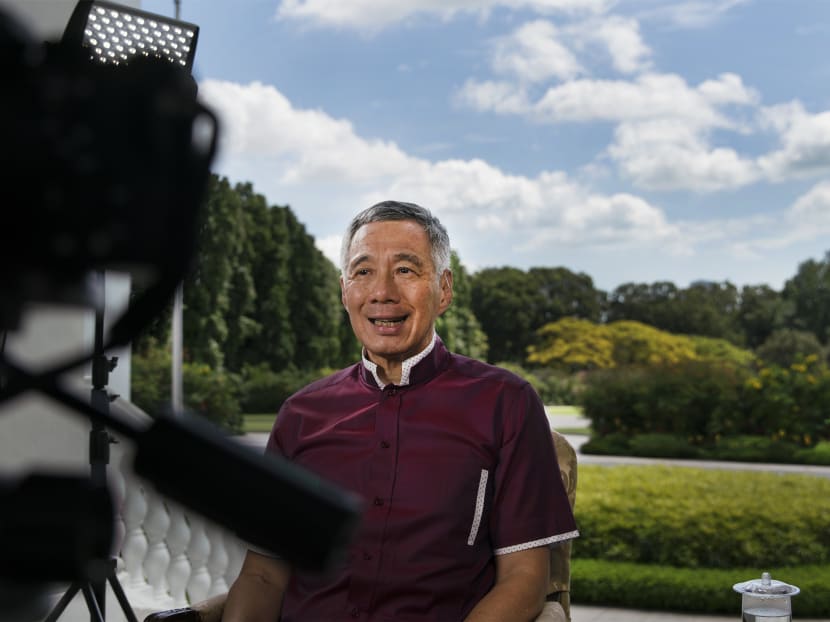Singapore 'not doing badly' but Govt keeping close watch: PM Lee
SINGAPORE – The Republic’s economy is expected to grow by more than one per cent, less than what the authorities were hoping for, said Prime Minister Lee Hsien Loong on Saturday (Dec 31) as he assured Singaporeans that the Government is watching the situation closely.
SINGAPORE – The Republic’s economy is expected to grow by more than one per cent, less than what the authorities were hoping for, said Prime Minister Lee Hsien Loong on Saturday (Dec 31) as he assured Singaporeans that the Government is watching the situation closely.
And considering the global economic uncertainties, Singapore is “not doing badly”, said Mr Lee in his New Year Message released on Saturday, in which he called the economy the major focus of 2016.
Last month, the Ministry of Trade and Industry forecast that the gross domestic product for next year will grow between 1 and 3 per cent.
Mr Lee said that while the labour market has eased, unemployment remains low and jobs are still being created. “I know many employers and workers are concerned, but rest assured the Government is watching this closely,” he said.
Over the past year, schemes were launched to help workers adapt and grow in the new environment, train them for jobs that are being created and offer career support to mid-career switchers.
SkillsFuture ramped up its Earn and Learn Programme, study awards and fellowships for various sectors while industry transformation maps are being developed for different industries, said Mr Lee.
The Committee on the Future Economy is also working on longer term strategies for growth and its recommendations will be published in a few weeks, he added.
Apart from these efforts, Mr Lee noted that Singapore has also been strengthening ties with overseas partners to create opportunities for Singapore companies and Singaporeans.
Prospects for the Trans-Pacific Partnership have dimmed but Singapore continues to pursue other avenues of economic cooperation, such as through the proposed Regional Comprehensive Economic Partnership, he said.
With Australia, both countries recently concluded a Comprehensive Strategic Partnership. With China, there has also been progress on the Chongqing Connectivity Initiative, the third Sino-Singapore government-to-government flagship project.
Closer to home, Singaporean firm Sembcorp Development is developing the Kendal Industrial Park in Semarang with its Indonesian counterpart. Earlier this month, Singapore and Malaysia signed a historic bilateral agreement for the high speed rail project.
Singapore is also on its way to be a “city for all ages”, said Mr Lee.
For the elderly, some 150,000 senior citizens are benefiting from the Silver Support scheme that supplements the retirement payouts of the low-income. A review of the Central Provident Fund was completed in August and in February, the authorities launched a S$3 billion action plan for successful ageing.
Mr Lee added that more parents are also enjoying good and affordable pre-schools, with 17,000 more children benefiting from the Ministry of Education kindergartens as well as from having the anchor and partner operators.
Singaporean students also topped the Programme for International Student Assessment (Pisa) and the Trends in International Mathematics and Science Study (Timss) rankings for reading, math and science.
On the political front, the Elected Presidency scheme was updated to include a “constitutional safeguard” that would ensure that the President was elected from different ethnic groups.
“The next Presidential election will be reserved for Malay candidates. I look forward to Singapore again having a Malay Head of State since Yusof Ishak, our first President,” he added.
Although Singapore is making good progress, the world around us is in a flux, said Mr Lee.
“In our own region, the terrorism threat has grown, even within the last year. Race and religion continue to be prominent issues. In neighbouring countries these powerful forces are affecting politics, and creating tensions and uncertainty,” he said.
Elsewhere, a mood of “nativist nationalism” has also grown in developed countries.
“There is profound angst and discontent with the impact of technology and globalisation. People want to shut themselves off, to insulate themselves from foreign competition,” he said. “This will most likely hurt themselves and fail to improve their lives.”
Small countries like Singapore cannot close ourselves up. “Our best choice is to stay open, to continually reinvent ourselves, and to stand out among the countries of the world,” said Mr Lee.







